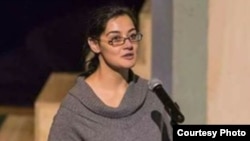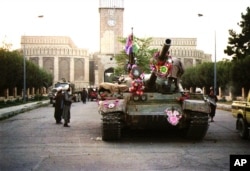It's easy to understand why Heela Najibullah would crave revenge.
Her father, Afghan President Najibullah, was executed by the Taliban, his body and his brother's dragged by a truck through the streets of Kabul before they were strung up for public display.
But Heela has managed to quell her inner demons. Now an aid worker living in Switzerland, she not only wants peace for her homeland but also hopes to play a role in its reconciliation and the compromises that will have to be made to achieve peace.
"Losing my father and uncle was not easy, but it certainly made me stronger. Learning to forgive was a very difficult process. It is time-consuming," Heela told VOA in an interview, adding that she saw it as her only choice after years of suffering, tribulations and despondency.
"When someone suffers loss or violence, all they want is justice and revenge. I always tell them, 'When I lost my father at the age of 18, if somebody would have asked me then, "What do you want?," "Revenge" would have been my only reply.' "
Healing process
She said she had to heal her own wounds since she wanted to play a positive role for humanity. She realized that it was not just one person who was responsible for the assassinations; there was a political history behind it and factors about which she will never learn the truth.
"So instead of me having the feelings of excruciating pain and grieving forever in my heart, I needed to find a closure to live peacefully with a clear conscience and to forgive," Heela said.
Najibullah was president of Afghanistan and its fractious factions from September 1986 to April 1992. He took refuge in the United Nations headquarters until his brutal death on Sept. 26, 1996.
Heela spent years as a refugee before getting a Swiss visa. She now works in migration consultancy in an international organization. She knows she may never see a peaceful Afghanistan, but also realizes thousands of other Afghans face the same fate. She decided to help those who are taking the same journey that she and her family began in 1994.
"Since 2014, we have been having migration crises in Europe, and the crisis in Afghanistan has never improved. I am also working on integration of Afghan refugees in Europe," Heela said.
Approaches to peace
She also wants to contribute to the reconciliation process in Afghanistan, so she looked for ways to end the conflict. She wrote a book, Reconciliation and Social Healing in Afghanistan, looking at the past and current approaches to peace.
"I know I am living my father's dream," Heela said. "I think I am following my father's ideals, with my actions, by doing research on Afghanistan, by bringing this book out, by being reconciliatory, by being forgiving and honest, by being in touch with my people, by being able to listen and sit with my opponents, who come from very different ideological backgrounds. That's what he taught me."
Heela considers her book more than a mere intellectual exercise. She wants it to be a guide for U.N. and Afghan policymakers.
"If the international community wants to solve the problem of Afghanistan through a military approach only, that's not possible, because the problem of Afghanistan is not only political, but it is also social, and we need to come up with innovative ways to find a durable solution politically, socially and economically," Heela said. "It cannot be done militarily only."





